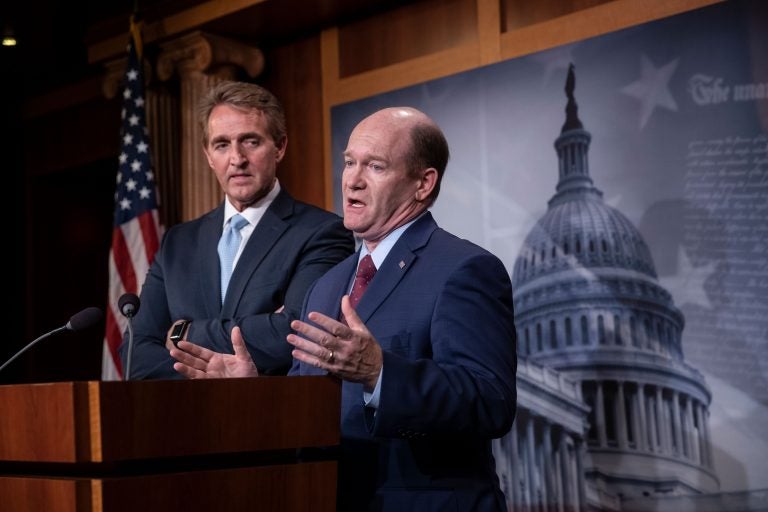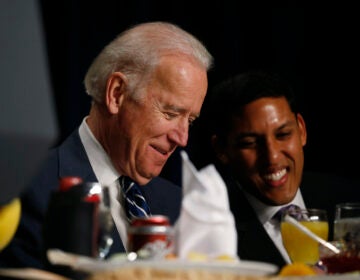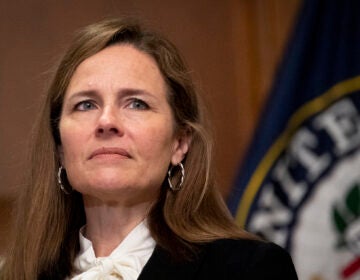Will politics ever be civil again? U.S. Sen. Chris Coons says it’s up to voters
After a tumultuous week in Washington, Will politics ever be civil again? Current and former senators talk partisan politics in the era of Trump.

Sen. Jeff Flake, R-Ariz., left, and Sen. Chris Coons, D-Del., speak to reporters about their effort to bring up legislation to protect special counsel Robert Mueller, at the Capitol in Washington, Wednesday, Nov. 14, 2018. (AP Photo/J. Scott Applewhite)
As Democrats begin an impeachment inquiry into President Trump’s phone call to Ukrainian President Volodymyr Zelensky, it may seem like the divide between Republicans and Democrats has never been greater.
But U.S. Sen. Chris Coons of Delaware and others at a Notre Dame forum say there was at least one time it was absolutely worse. Prior to the start of the Civil War, Massachusetts Republican Sen. Charles Sumner gave a rousing speech condemning slavery and the South. He was then beaten into unconsciousness in the Senate chamber by a fellow Congressman from South Carolina.
“Are we at the verge of that sort of bloody internal division? No, not yet,” said Coons, a Democrat. He joined former Sen. Jeff Flake, a Republican from Arizona, and former Sen. Joe Donnelly, a Democrat from Indiana, at a forum hosted by Notre Dame Law School in Indiana. Focusing on partisan politics in the Trump era, the three spent two hours talking about their frustrations with the lack of civility in Washington and how there is little effort in Congress to actually get things done.
“Does this threaten our democracy? Absolutely, yes,” Coons said. He said the rancor in Congress hurts the image of the U.S. as an example for other nations to follow. “The more we demonstrably fail to solve our nation’s problems through peaceful compromise and debate here, the more it says to the world, ‘Maybe not such a great model.’ ”
From immigration to the budget to gun legislation, Coons said it’s frustrating to not be able to get things done.
“Can I trot out to you a long list of bipartisan bills of which I’m a co-author and co-sponsor? Yes,” Coons said. One of those bills would require police to be notified if a convicted felon walks into a gun shop and lies on a form. “We can’t get that through the Senate of the United States today.”
Coons put some of the blame on Trump’s incendiary and incessant use of social media, particularly Twitter.
“Tweeting at 3 a.m.? Not a good idea,” Coons said. But it’s the red meat, us-versus-them messaging online that builds big followings on both sides of the aisle. Coons said at times he’ll question his staffers over why his social media following isn’t bigger. “They say, ‘well, you keep turning down our suggestions for a truly memorable tweet,’” Coons said. “If you’re snarky and you’re willing to use vulgar language, you drive your follow-ship, which then translates to donors, which then translates to invitations to do other things on national media.” Coons said all Americans should restrain themselves, but especially those who are elected.
One year ago today, Sen. Flake was confronted in an elevator in the Capitol by two women who demanded he vote against Brett Kavanaugh’s nomination to the Supreme Court. Flake, a Republican who did not seek re-election in 2018, was a frequent critic of President Trump, particularly of his crude language. He said Trump’s opponents shouldn’t stoop to that level.
“This kind of language has no place in politics, the fact that the president uses crude language does not excuse the rest of us, we should do better,” Flake said, reiterating a tweet he published following the 2018 midterm election. He said the overwhelming response to that idea was if the President speaks this way, then so must we. “That’s the place we’re in right now,” Flake said.
The lawmakers say improving a sense of camaraderie among members of Congress is one step to improve the divide. “You have to talk to each other,” Coons said. In decades past, Congress would spend most of its time in Washington, with only occasional trips back home during recess periods. That’s changed now and most members commute weekly to D.C. for session before heading back home. “We’re not expected to live together in Washington or even to socialize,” Coons said.
Flake added that members of Congress would form bonds with members of the other party through weekend activities like playing sports or going to church together. “Those bonds that they formed on the weekends outlasted the partisanship of the weekdays,” Flake said. “There’s an old saying, ‘you’ll never question your colleagues motives if you know the names of his or her children.’ And I’ve found that to be true.”
The answer also lies in who is being elected to Congress. “It’s up to you. If you hire an arsonist, don’t be surprised when the house catches on fire,” Coons said.
“If you are voting for and contributing to and sponsoring folks … who can’t give you an example of where they’ve been willing to compromise and upset their party in order to advance our common national interest, than don’t be surprised if the answer is dysfunction.”
Flake agreed, “You all can change it. Create some currency for bipartisanship. There is very little out there right now, I can tell you particularly in Republican primaries.” Flake’s decision not to run for re-election was influenced by his low poll numbers in the 2018 Republican primary. Coons said Flake couldn’t win re-election because he was “too reasonable.”
WHYY is your source for fact-based, in-depth journalism and information. As a nonprofit organization, we rely on financial support from readers like you. Please give today.




